Volta ao Algarve 2025 Preview 🇵🇹
Jonas Vingegaard and Primož Roglič get their seasons underway in Portugal in a race which features many more top riders and an interesting route.
The 51st edition of the Volta ao Algarve (English: Tour of the Algarve) gets underway on February 19 and will conclude on the 23rd after five stages.
The Volta ao Algarve has varied over the years in terms of what type of stage race it is. This is illustrated best by the period from 2007 to 2011, where the GC winners of the race varied significantly in terms of the profile of the winners.
Surprisingly, in 2007, Italian sprinter Alessandro Petacchi won the GC, one of five general classification victories in his career. The following year, Belgian classics man Stijn Devolder claimed the title, just under eight weeks before he won the first of two Tour of Flanders in his career. The subsequent two years were owned by El Pistolero, a.k.a Alberto Contador, during the period when the Spanaird won the Tour de France for the 2nd time. To complete the set, 4x world time trial champion Tony Martin won the GC in 2011, the same year he claimed his first world title.
The recent era of the Volta ao Algarve, however, has followed a pretty consistent profile of race. Since 2015, the race has pretty much been won by GC riders on almost every occasion, including the likes of Geraint Thomas (2015 + 2016), Primož Roglič 2017, Tadej Pogačar 2019, and Remco Evenepoel (2020, 2022, and 2024). Despite this, the race has also suited time trial specialists who can climb to a solid extent. The likes of Filippo Ganna, Stefan Küng, Ethan Hayter and Kasper Asgreen, among others, have all performed well here in recent times. However, this year’s edition seems particularly tough for those types of rider to succeed.
2024 Edition
As previously mentioned, Remco Evenepoel won last year’s edition, the third time in his career, the record amount. Incidentally, all three of Evenepoel’s victories are spaced by an edition, with the other two coming in 2020 and 2022, meaning we can probably expect the Belgian to win the 2026 edition of the Volta ao Algarve, as he skips the race this year, due to his current injuries.
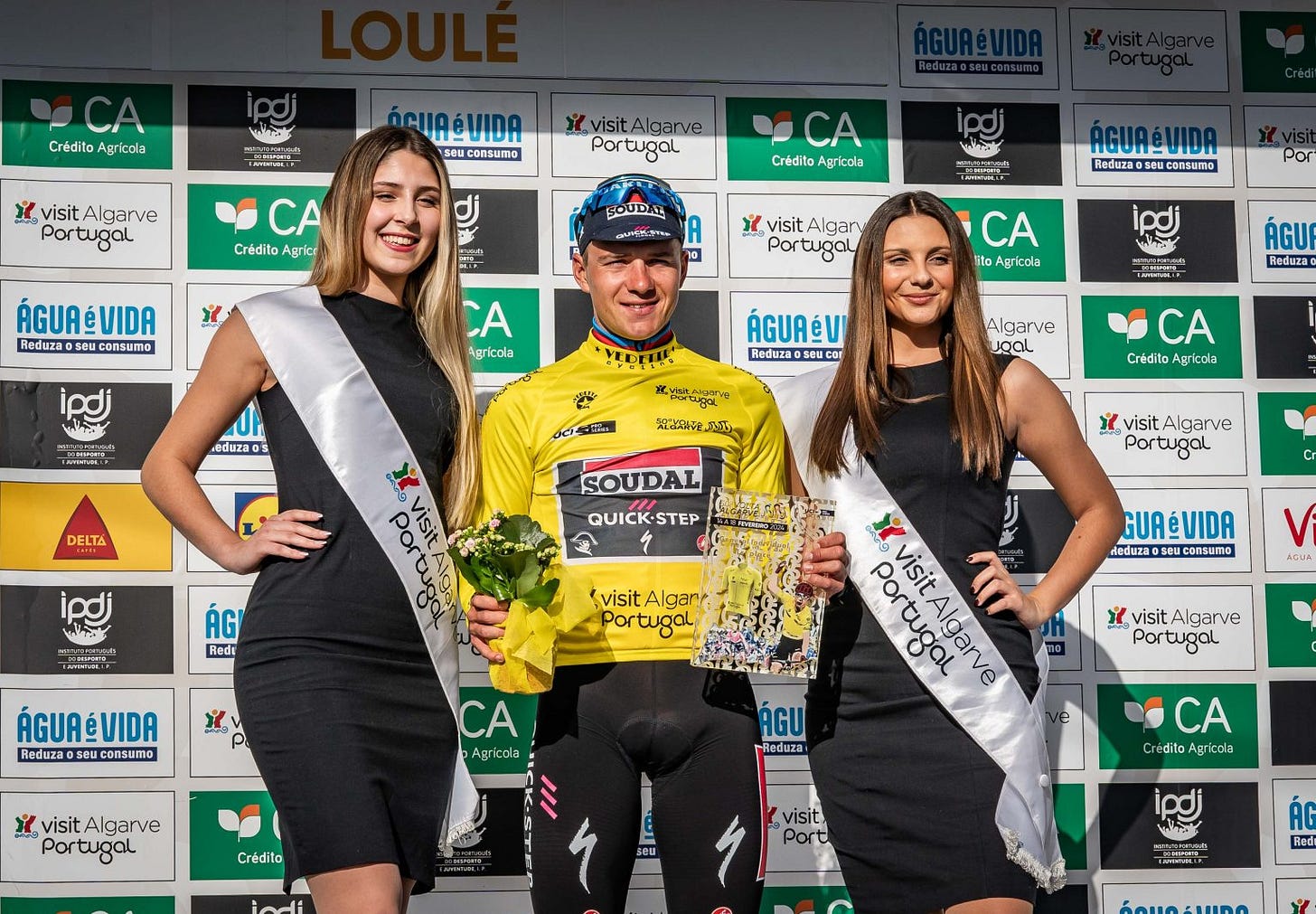
GC Podium
Remco Evenepoel 🇧🇪 | Soudal Quick-Step
Daniel Felipe Martínez 🇨🇴 | Red Bull - BORA - hansgrohe
Jan Tratnik 🇸🇮 | Team Visma | Lease a Bike
Stage Winners
Stage 1 | Gerben Thijssen 🇧🇪 | Intermarchè - Wanty
Stage 2 | Daniel Felipe Martínez 🇨🇴 | Red Bull - BORA - hansgrohe
Stage 3 | Wout van Aert 🇧🇪 | Team Visma | Lease a Bike
Stage 4 | Remco Evenepoel 🇧🇪 | Soudal Quick-Step
Stage 5 | Daniel Felipe Martínez 🇨🇴 | Red Bull - BORA - hansgrohe
Race Schedule
Stage 1 | Portimão - Lagos (190km) | Wednesday 19 February | Sprint Stage
Stage 2 | Lagoa - Alto da Foia (177.6km) | Thursday 20 February | Mountain Stage
Stage 3 | Vila Real Santo António - Tavira (183.5km) | Friday 21 February | Sprint Stage
Stage 4 | Albufeira - Faro (175.2km) | Saturday 22 February | Sprint Stage
Stage 5 (ITT) | Salir - Malhão (19.6km) | Sunday 23 February | Mountain Time-Trial
Contenders
GENERAL CLASSIFICATION
The Volta ao Algarve has been able to attract plenty of big names over recent editions, and 2025 will be no different. Five former Grand Tour winners and two former world road race champions are some of the talent that are in attendance this week in Portugal.
Jonas Vingegaard (Team Visma | Lease a Bike) begins his season in Portugal for the very first time in his career. With a Tour-Vuelta double on the race schedule for the Dane in 2025, it is safe to say that it’s a long season ahead, but starting on the right foot will be important to Vingegaard and the team.
Whilst we are not expecting to see Vingegaard clash with Tadej Pogačar until the Critérium du Dauphiné in June, the Volta ao Algarve will still allow us to see how he gets on against the likes of Primož Roglič and João Almeida. Both were sitting in the top 5 of GC of the Tour de France after stage 11, with the Portuguese rider finishing 4th overall after Roglič crashed out. Therefore, the competition in the Algarve is still strong enough to give Vingegaard a very good test and will provide a solid indication of how the Dane’s early season form is. Vingegaard will be the distinct favourite for stages 2 and 5, but he still has to deliver the goods because, as mentioned, the start list is very decent.
Speaking of Primož Roglič (Red Bull - BORA - hansgrohe), you would be hard-pushed to find a better one-week racer in the history of professional cycling than the 35-year old Slovenian. Of the seven major tours (Paris-Nice, Tirreno-Adriatico, Volta a Catalunya, Itzulia Basque Country, Tour de Romandie, Tour de Suisse, and Critérium du Dauphiné), Primož Roglič has won 10, only bettered by Sean Kelly’s 14.
In total, 17 one-week GC victories in his career is a remarkable return for Roglič, who will be hoping that this prolificacy can be translated once more into a grand tour victory at the Giro d’Italia come May. Roglič is also scheduled to ride the Tour de France in July, but as we have seen time and time again, luck is never on the Slovenian’s side at the race. Perhaps racing the Giro d’Italia first will take the pressure off his shoulders come July, and he could come into the Tour under the radar. Regardless, the Volta ao Algarve will be the first indication of whether it is even realistic to consider that Roglič can match the likes of Vingegaard and Pogačar come July. The key right now is to make sure Roglič can get to the race fit and healthy, avoiding incident or illness. Once that is sorted, the road will decide what happens in July.
However, as mentioned, Roglič has been adding one-week stage races to his palmares in the same way Thanos set out to collect the Infinity Stones, so it would be no major surprise to see him win the Volta ao Algarve, despite the presence of Jonas Vingegaard.
João Almeida (UAE Team Emirates - XRG) has the right to be considered in the question of being the best GC rider right now outside the “big 4”, after last year’s 4th place at the Tour de France. At 26 years old, now feels like the perfect time for the Portuguese rider to step it up to the next level. The only issue for Almeida is that chances will be limited as he will be riding in support of Tadej Pogačar at the Tour de France and potentially La Vuelta if the Slovenian is on the start list. That means that the week-long stage races become even more important for Almeida as an opportunity to shine. He narrowly missed out on the Volta a la Comunitat Valenciana to a brilliant Santiago Buitrago, meaning Almeida will be hungry for success. Added to the fact that the Volta ao Algarve is the Portuguese rider’s home race, we could be set to see a highly motivated and firing João Almeida, trying to close the gap to Vingegaard and Roglič.
Antonio Tiberi (Bahrain-Victorious) seems to be Italy’s big GC prospect after a brilliant 2024 season, which saw him finish 5th at the Giro d’Italia and win the Tour de Luxembourg. At 23 years of age, there’s still plenty to learn and room to grow stronger, with the posibilitity that Tiberi could become a serious GC rider in years to come. The Giro and Vuelta are on the cards for Tiberi in 2025, and this race should suit the Italian, in particular stage 5, as he is a strong time-trialist.
Thymen Arensman and Geraint Thomas (INEOS Grenadiers), Ilan Van Wilder (Soudal Quick-Step), Wilco Kelderman (Team Visma | Lease a Bike), are all GC riders who typically excel on time trials and, if they are racing for GC, should be competitive on stage two as well. Some of these riders could finish inside the top 10 and even top 5. Geraint Thomas has officially announced that he will retire at the end of the season, after a glittering career which has seen him win him become the only rider in history to win both the Tour de France and E3 Harelbeke. ;)
Two former grand tour winners, Tao Geoghegan Hart (Lidl-Trek) and Sepp Kuss (Team Visma | Lease a Bike), have shown how brilliant they can be in the past but have lacked consistency over the last 12-16 months for various reasons. This race could provide a good opportunity to lay the foundations for a solid season ahead. Kuss’s priority will be supporting Vingegaard, but that may naturally lead to a good GC position after stage two.
There are plenty of young riders who will be worth watching too. The UAE Team Emirates - XRG duo of António Morgado and Jan Christen have been a breath of fresh air to watch so far in 2025. Both are already winners in 2025 and are looking like two of the biggest prospects in the sport. Whether GC is the end goal for the duo remains to be seen, and with João Almeida in the team, there’s no pressure on them heading into this race too, which can only be a positive. Expect them to try and animate the race, whether that is for GC or not.
Portugal is the starting location for Romain Bardet’s (Team Picnic PostNL) farewell tour, as the French rider will retire after the Critérium du Dauphiné in June. He looked in good shape at the Figueira Champions Classic a few days ago and could be a podium contender here in the Algarve. A lot has been made about the potential of Max Poole (Team Picnic PostNL) ever since he finished 4th on GC at the Tour de Romandie in 2023. We may learn more in this race about his 2025 prospects as a GC rider after a strong showing from breakaways at last year’s La Vuelta.
Oier Lazkano and Jan Tratnik (Red Bull - BORA - hansgrohe) have both shown they can ride well on GC over one week despite it not being their speciality. With Primož Roglič as team leader, they aren’t expected to challenge, but it would be no harm keeping one of them close on GC if Roglič has a problem. Tratnik finished 3rd on GC at this race last year too.
Two wildcards are Mathias Vacek (Lidl-Trek) and Filippo Ganna (INEOS Grenadiers). Neither are considered GC riders, but both are remarkable good climbers for their size. Typically, time trial riders often perform well on GC at the Volta ao Algarve due to the nature of the mountain stages and the often inclusion of a time trial itself.
The flat portion of the time-trial on stage 5 will also suit them down to the ground, and it would be no surprise to see them involved in the sprint finishes. This possibility has been augmented due to the early signs of good form the duo have shown so far this season.
However, it is important to caveat that it would equally be no surprise if both decided against racing for GC on stage 2 up the Alto da Fóia. The climb is more difficult than in previous years, and the fact that stage five’s time trial finishes atop the Alto do Malhao makes things much more complicated for the time trialists to be involved in a GC capacity this year.
Other riders who could feature in the top 10 include Ben Tulett and Tiesj Benoot (Team Visma | Lease a Bike), Laurens De Plus (INEOS Grenadiers), Rui Costa and Neilson Powless (EF Education EasyPost), Remy Rochas and Romain Grégoire (Groupama FDJ), Maximilian Schachmann and Mattia Cattaneo (Soudal Quick-Step), Julian Alaphillipe and Yannis Voisard (Tudor Pro Cycling Team), Ion Izagirre and Emanuel Buchmann (Cofidis), Afonso Eulálio and Damiano Caruso (Bahrain-Victorious), and Jakub Otruba (Caja Rural - Seguros RGA).
SPRINTERS
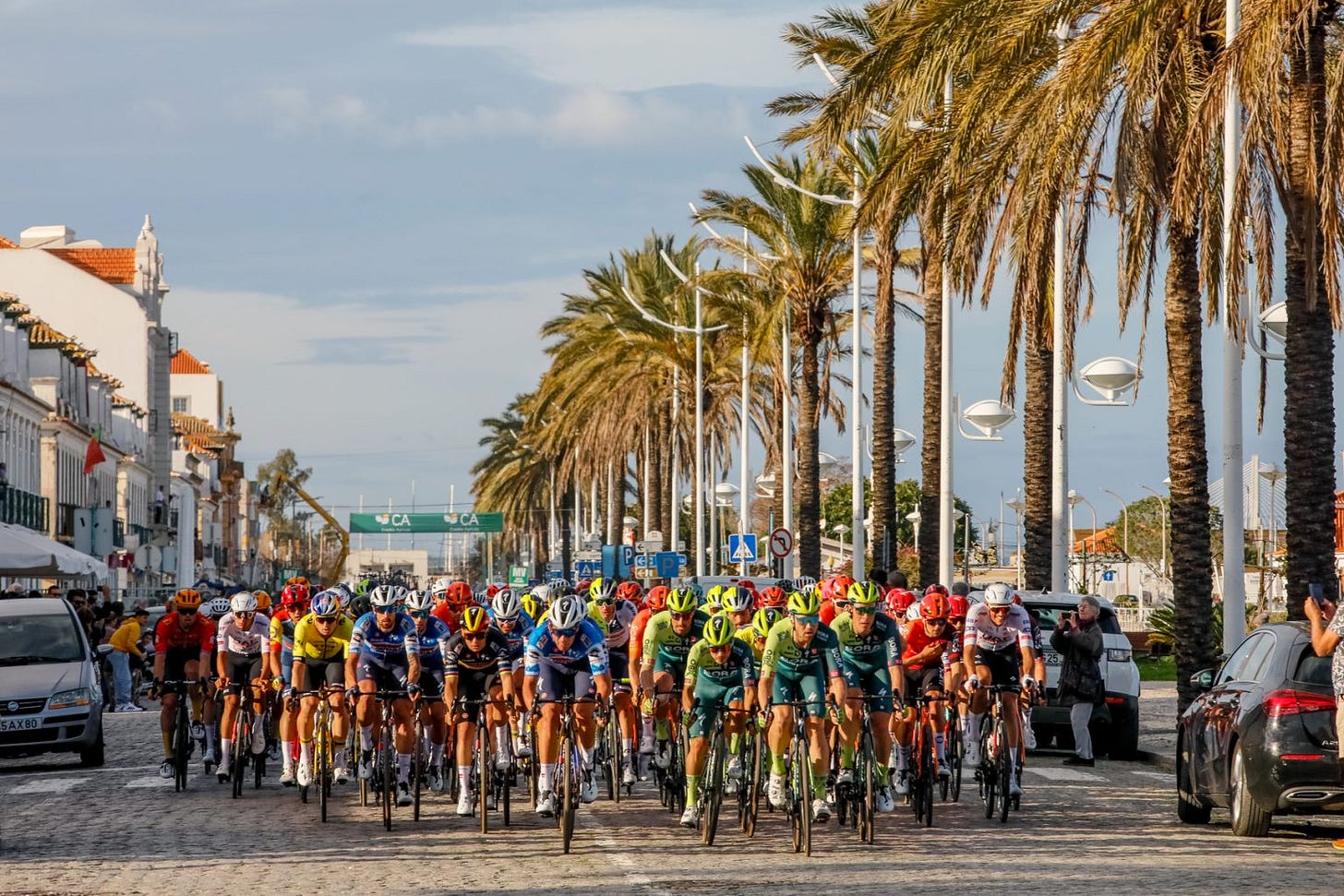
There’s a pretty strong cohort of contenders for the three potential sprint stages on offer at this year’s Volta ao Algarve, including two former green jersey winners at the Tour de France.
2024 was an epic year for the history-making Biniam Girmay (Intermarché Wanty), who had the dream Tour de France, winning three stages and the green jersey. With results comes expectation, and with expectations comes pressure. For Girmay, the standard has now been set, and the goal for 2025 will be to do everything he can to match that remarkable Tour de France.
The Eritrean has raced four times already this season, with a 4th at the Trofeo Ses Salines, the closest he has come to victory. Making his debut at the Volta ao Algarve, this race provides the perfect opportunity for Girmay to lay down a marker to all of his rivals, ahead of what is set to be one of the most competitive seasons for the sprinters in a very long time.
We all know how good Wout van Aert (Team Visma | Lease a Bike) can be in a fast and flat finish, winning four bunch sprints at the Tour de France in the past, among many other brilliant sprint wins. However, as we have seen on plenty of occasions, Van Aert doesn’t always have the freedom to sprint, as he is tasked with protecting the team’s GC leader, which in most cases is Jonas Vingegaard. With the Dane in attendance here for his season opener, there could be a chance that Wout van Aert’s opportunities are limited. However, if given the chance, the Belgian star could add to his stage win from last year’s race.
Two Belgians who are sure to be in contention for the sprints are Arnaud De Lie (Lotto) and Jordi Meeus (Red Bull - BORA - hansgrohe), respectively. De Lie, the Belgian champion, is already up and running for 2025, taking a rainy stage 3 of the Etoile de Bessèges. The little rises in some of the finishes will suit De Lie particularly. This isn’t likely to have too big of an impact, but it certainly doesn’t hurt the Belgian’s chances. The key for De Lie will be positioning, as this is something in which he still has room for improvement. However, if he finds himself in the right position at the right time, he will be very difficult to beat.
Jordi Meeus is a rider who continuously flies under the radar, which seems bizarre considering the Belgian won the Champs-Elysées stage at the Tour de France back in 2023, dubbed the unofficial sprinter’s world championships. Perhaps it’s the fact that Meeus is often the nearly man. Always in the mix but not as prolific a winner as the previous riders mentioned so far. Sooner or later, things are going to change for the Belgian and this could be the start point.
Casper van Uden (Team Picnic PostNL), Milan Fretin (Cofidis), and Madis Mihkels (EF Education EasyPost) are all talented young riders who seem to be improving year-on-year. It would be no surprise to see one of these riders come to the fore on one of these sprint stages.
Alberto Dainese (Tudor Pro Cycling Team) is a 3x grand tour stage winner, showing the Italian has good pedigree. Mathias Vacek (Lidl-Trek) is an all-round beast who could be involved in the sprints but may have his eyes set on the GC instead as previously mentioned. Jasper Stuyven (Lidl-Trek) may be involved instead.
Other riders to watch out for on the sprint stages to be in the top 10 mix are Vito Braet (Intermarché-Wanty), Rui Oliveira (UAE Team Emirates - XRG), Warre Vangheluwe (Soudal Quick-Step), Iúri Leitâo (Caja Rural - Seguros RGA), Alberto Bruttomesso (Bahrain-Victorious), Lewis Askey (Groupama FDJ), and Sam Watson (INEOS Grenadiers).
Stages
Stage 1 | Portimão - Lagos (190km)
The opening stage is the first of potentially three stages for the sprinters. Portimão and Lagos have respectively played host to stage 1 as the start and finish town since the 2019 edition.
The stage tends to be very similar in most editions, following the same pattern of being a day filled with plenty of climbing, but always destined to end in a sprint finish in Lagos, and this year is no different. The only notable difference is, in fact, the decrease in vertical metres gained in the stage compared to recent years, making this stage even more likely to end in a sprint finish.
The only categorised climb on route is the regular, Nave. It’s a third category climb, standing 5.4km long with an average gradient of 4.4%. In the last four editions of the Volta ao Algarve, the opening stage has featured this climb.
However, beyond this climb and a few intermediate sprint points, this stage is destined to conclude with a sprint finish in Lagos. That is unless Iúri Leitão or someone as similarly strong takes a flyer in the final km or two and causes an upset.
Stage 2 | Lagoa - Alto da Foia (177.6km)
The Alto da Foia has become synonymous with the Volta ao Algarve in recent years. It usually serves as host to the first of two summit finishes in the race, with the Alto do Malhão following later on. However, the Alto do Malhão road stage is not on the route for this year’s edition with a time trial instead finishing on the climb, meaning that stage 2 becomes even more crucial from a GC perspective.
Things have changed for this year, however, as the riders will be tackling the Alto da Foia from a different side than what we are used to seeing. In recent editions, we have often seen the riders wait until the final km to make their moves, and the stage has often ended with a mountaintop sprint from a selective group. This year, the climb is an extra km longer, now 8.5km, and has an average gradient of 5%. However, the climb gradients increase throughout, and the final few km are the steepest.
It will be a stern test this year, and will play right into the hands of the race favourite, Jonas Vingegaard (Team Visma | Lease a Bike). Other riders who will appreciate the harder nature of the climb this year should be Primož Roglič (Red Bull BORA - hansgrohe) and João Almeida (UAE Team Emirates - XRG).
Stage 3 | Vila Real Santo António - Tavira (183.5km)
Like the opening day, stage 3 is also a carbon copy of the previous year’s route, with the slight tweak of being even lighter in terms of vertical metres gained with 1,534m compared to 2,572m. The same pattern follows, however, with a 3rd category climb in the middle of the stage, before the Faz Fato climb (also 3rd cat), in the final 40km before a fast finish in Tavira.
The final few km will be fast as the run-in is slightly downhill before a slight rise to the finish line in the last couple hundred metres.
Stage 4 | Albufeira - Faro (175.2km)
The third and final sprint stage of the race sees the riders travel 175.2km from Albufeira to Faro.
There are four categorised climbs on this stage, more than the other two sprint days. The second category, Malhao, is 2.2km at 8.7%, so quite steep, but comes far too early in the stage to have any significant impact.
The following three climbs all come much closer together in the second half of the stage. Firstly, Picota is 2.4km at 5.3% and is crested with 53km to go. Santa Barbara follows and is 2.8km at 4.9%. Importantly, there are bonus seconds at the top of this climb, which could be crucial in the GC battle. There is a plateau, but no descent, before the riders take on the final climb, Bordeira, 0.7km at 4.9% with the summit coming 16.5km from the finish line.
Following the climbs, the riders will briefly descend before the flat final 10km to Faro, where the sprint teams will be organising their trains and fighting for position. For the GC riders, the key will be to stay safe and avoid incidents. Like stage 3, there is a slight rise inside the final 500m to the finish line in Faro.
Stage 5 (ITT) | Salir - Malhão (19.6km)
The conclusion of the 2025 Volta ao Algarve will take place courtesy of an individual time trial that finishes atop the Alto do Malhao. Usually, the Alto do Malhao plays host to the final road stage, but this year’s version in the form of a time trial will spice things up.
The first 17km of the time trial is on undulating terrain but should suit specialists such as Filippo Ganna. However, the finishing climb up the Alto do Malhao should swing things into the favour of the climbers such as Primož Roglič and Jonas Vingegaard.
The climb isn’t particularly long, standing at only 2.1km. However, it’s the average gradient that makes it hard to see past a climber winning this time trial. A 9.3% average gradient is brutally steep and will play right into the hands of Primož Roglič and Jonas Vingegaard, who have both won grand tours due to performances on mountain time trials in the past.
It will be an agonisingly painful ending to the 2025 edition of the Volta ao Algarve, with the stage winner likely to have won the GC in the process too, or at the very least finish on the podium.
Thank you for reading!
If you enjoyed this preview, it would be greatly appreciated if you could like, share, and comment below your predictions for the race!
Joe

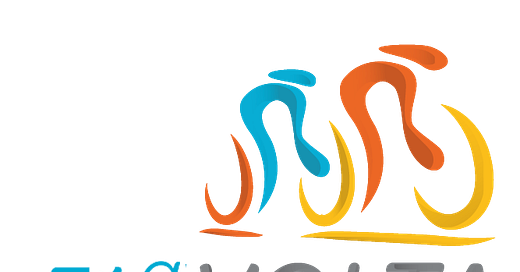



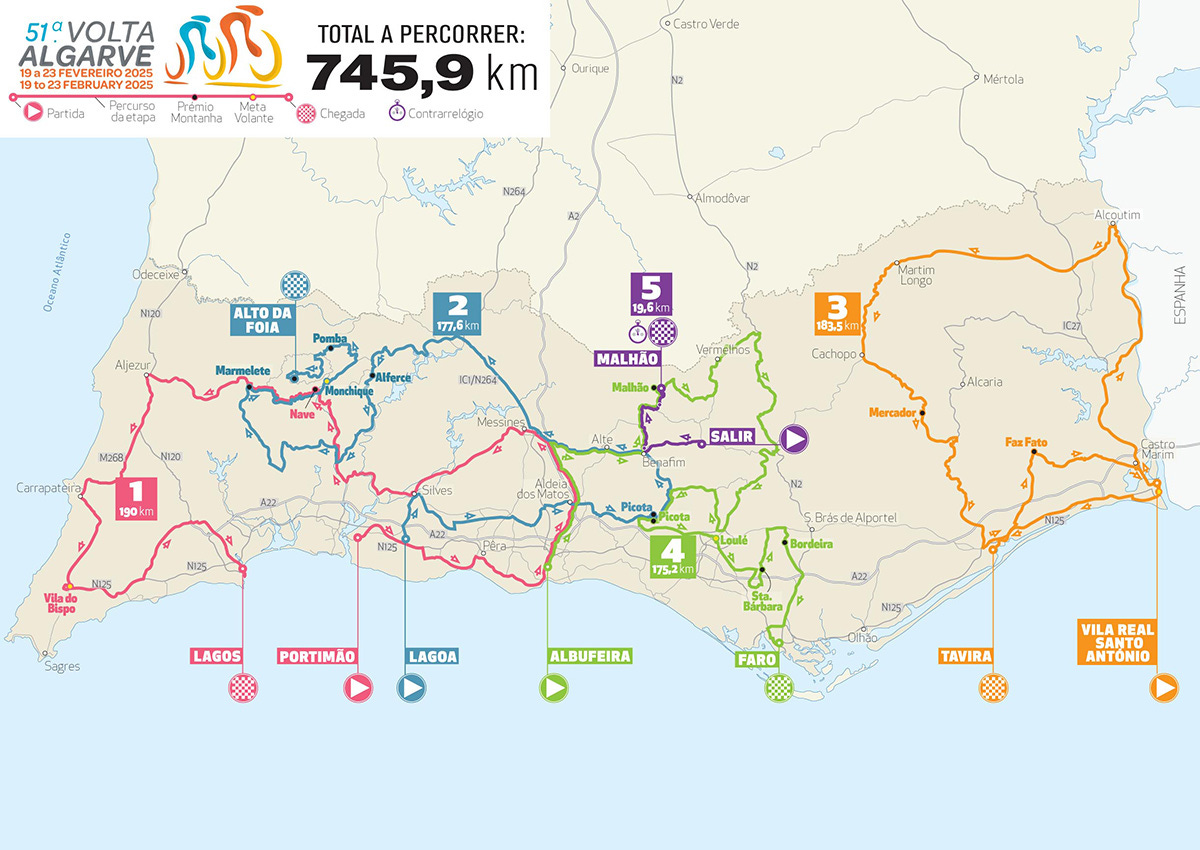
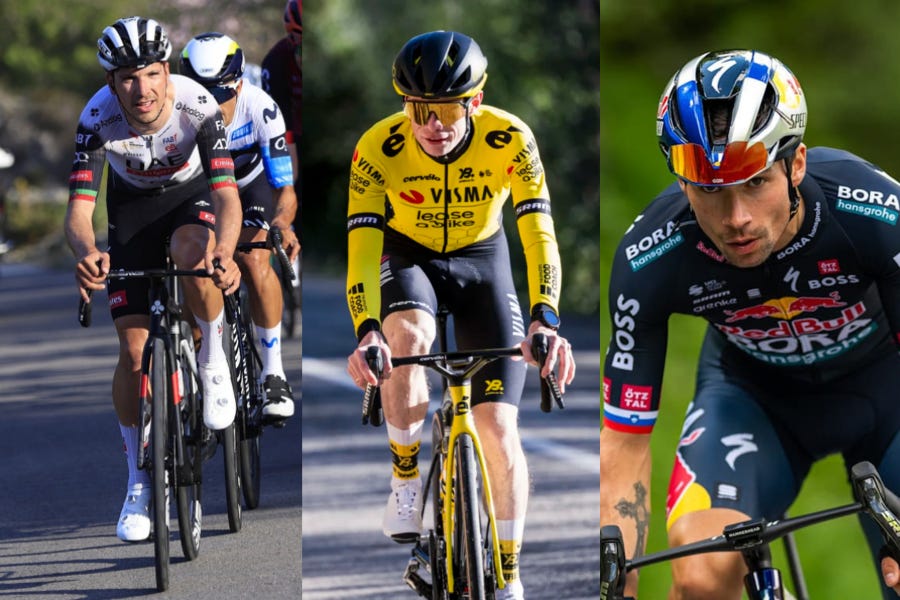
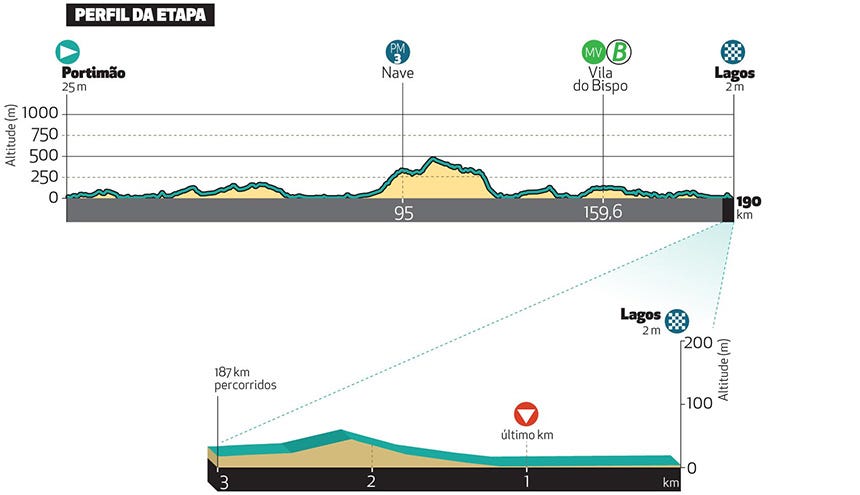
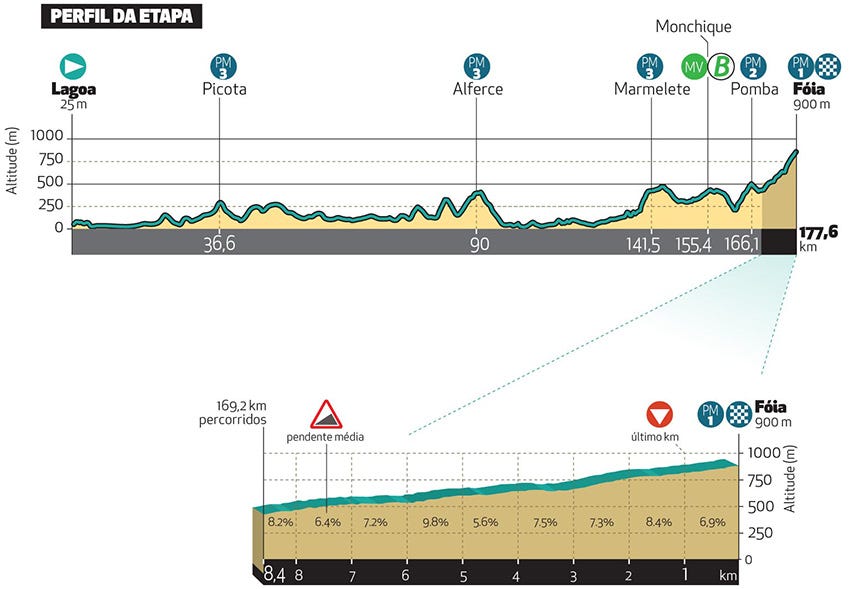
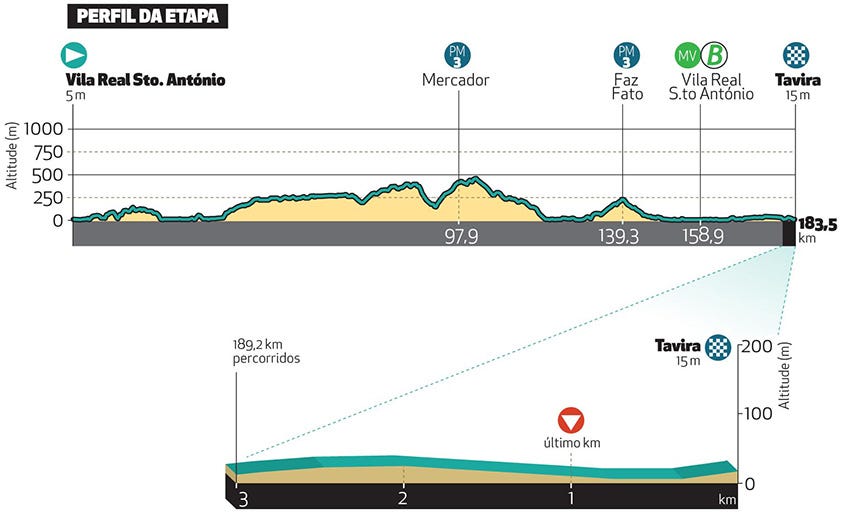
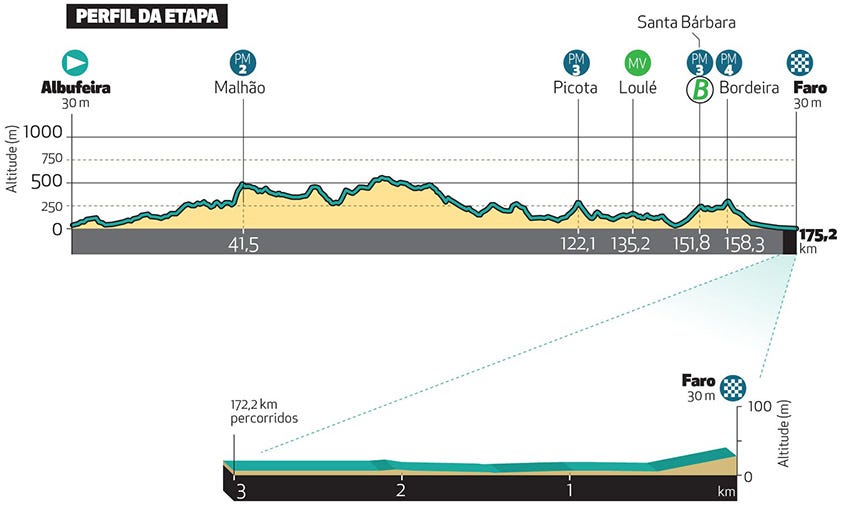
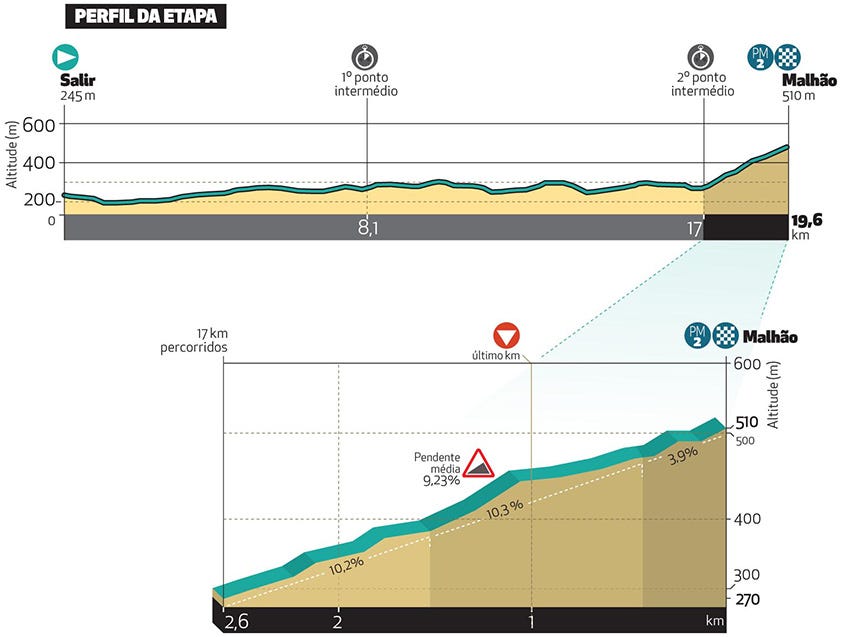
I don’t love a finishing TT, but that last stage profile screams Primoz!
Stage 1:
Girmay at +450 for a sprint..
take my money 😅